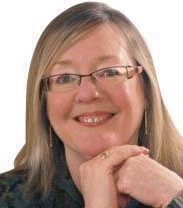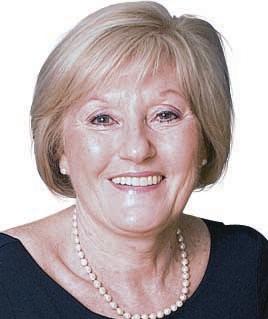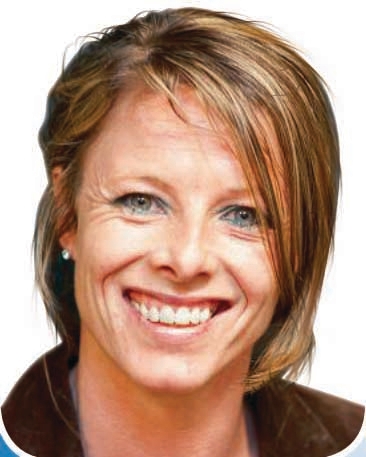You are viewing 1 of your 1 free articles
Get on board with equality
Will the Welsh housing sector address gender inequality in the boardroom? Pete Apps discovers that one man is set on making sure housing associations take action
Welsh housing minister Carl Sargeant has posted a selfie for his Twitter profile which reveals a lot about his political priorities.
The burly Welshman has snapped an Instagram shot of himself wearing a black T-shirt with the phrase ‘this is what a feminist looks like’ emblazoned across it.
While Mr Sargeant could never be mistaken for suffragette Emmeline Pankhurst, the minister is very much a feminist and his housing policies are starting to reflect this conviction.
At a Community Housing Cymru conference last November, he demonstrated his commitment is more than just words and announced his plan to introduce a new ‘code of governance’ setting out the rules and procedures for housing association boards. One of the key effects of this code is a push towards gender equality at boardroom level.
‘Housing associations need modern boards for a modern world,’ he told the conference.
Mr Sargeant has already asked for landlords to take ‘practical action’ to achieve better diversity on boards, and the code of governance will formalise this when it is published.
So how far does the Welsh sector have to go to achieve diversity? And are landlords in the country all as committed to the goal as the campaigning housing minister?
Research by the Welsh Government suggests that currently 38 per cent of board members are female, and Inside Housing’s analysis of 25 Welsh housing associations which have lists of their board members available online found 106 women out of an overall total of 303 board members - 35 per cent - with 10 female chairs.
Of these 25, just three have boards where more than 50 per cent of the members are women, and 11 have less than a third.
The lowest, 1,700-home Tai Eyryi, has just two women out of 13 board members - just 15 per cent. The landlord refused to comment when contacted by Inside Housing about the matter.
Below target
The EU ‘gold standard’ sets a target of 40 per cent female boardroom membership and so, while Welsh housing associations are not far off this, there is clearly room for improvement and Mr Sargeant’s aim would still require a huge shift in the make-up of some boards.
‘It is better than some other sectors,’ says Joy Kent, chief executive of Chwarae Teg, a charity which has been working on gender equality issues in Wales since 1992. ‘But it’s still not 50 per cent.’
At present, the plans to increase female representation on Welsh landlords’ boards are at a formative stage. Mr Sargeant is still working on the code of governance, which Nick Bennett, chief executive of Community Housing Cymru, the representative body for housing associations in Wales, suggests is likely to be in place before the end of the year.
At this stage, it appears the plan is for a general push for housing associations to deliver better gender equality, rather than a hard and fast rule.
Exactly how landlords will be required to go about achieving diversity is yet to be decided. But it is hoped that getting the ball rolling by bringing more female members on board will create momentum for the issue to resolve itself.
Implementing change
The Regulatory Board for Wales, the government body responsible for the regulation of Welsh housing associations, approved an action plan for better board diversity in January.
Another key change planned by Mr Sargeant is to remove the ban on pay for Welsh boards. Currently, this is unique to Wales, with housing associations in the rest of the UK given the discretion to remunerate board members.
‘That is one thing that could incentivise more people to join up,’ says Mr Bennett. ‘And if you get a broader range of people applying, it becomes easier to select a broader range of board members.’
‘Over time we want to increase the number of female board members. I don’t think it’s about picking on individual boards,’ he adds.
‘Of course it’s going to mean change, but we need to ensure we respect existing expertise and avoid some sudden lurch that leaves boards without the necessary experience. It’s got to be a natural process.’
Hafan Cymru has the highest proportion of female board members according to Inside Housing’s research, with six women on its eight-strong board.
Catherine Davies, chief executive of the association, says: ‘What you find with recruiting board members is that many take a vertical route in. Someone on the board will suggest to someone they know that they should apply. On male-dominated boards, you find men often bring in more men.
‘I think as more women get into boards, they will start bringing more women in as well.’
A Welsh Government spokesperson says the most simple motivation for the move is that diverse boards are more effective.
‘The housing minister, Carl Sargeant has made clear that he would like to see greater diversity in the membership of the boards of housing associations,’ the spokesperson says. ‘There is evidence that boards with diverse membership, in terms of gender, age and professional experience perform better than less diverse boards.’
Ms Davies agrees with this assessment. ‘I’m generalising and I entirely accept that, but women do often have a softer approach to management,’ she says. ‘There is a greater tendency to take a meditative stance, and a desire to find the middle ground and reach consensus. Those skills can be very important on a board.’
She says she is currently hiring a new board member, and hopes to recruit more men to address the gender bias within her organisation.
Roger Waters, chair of 4,100-home Pennaf Housing Group, leads a 10-member board which includes four women.
‘It’s good to have a female perspective in discussions, because you do often find women have a different point of view on issues,’ he says.
‘I have made a conscious effort to bring in more female members, but it’s got to be the right person for the board rather than just right in terms of gender.’
It is clear that although an appetite exists for greater gender diversity, most agree this must be driven by the needs of the organisation as a business, rather than just to tick equality boxes.
‘You don’t want to be there just because you’re a woman, you want to be there because you are bringing something to the table. Hopefully, whenever I have held positions on boards, I have done that,’ says Chwarae Teg’s Ms Kent, who spent her early career in housing before taking the top job at the charity.
Ms Davies agrees. ‘It’s not just a question of gender balance, but skills balance, you have to get the right skill and expertise in the boardroom. But hopefully increasing diversity will help with that.
‘When I first started in housing, the make-up of boards was male, middle class and ageing. I know it has changed in recent years but that was the picture.’
North Wales Housing has one of the better board gender splits with six women sitting on its 13-strong board.
Paul Diggory, chief executive of the 2,370-home association, says attracting women can be difficult as a result of their professional backgrounds.
‘I think it may be a factor that often the sector recruits board members who have retired from careers in business, finance or construction. They tend to be male, because while there have been changes recently, a lot of women who have had successful careers in those sectors are not reaching retirement age yet,’ he says.
Professional bias
Debbie Smyth, chair 8,000-home Bron Afon Community Housing says this could be combatted by changing hiring policies.
‘If you were looking for board members from sectors like education, health and social care, which are more female-dominated, you would certainly get more women applying.’
Dr Norma Barry, chair of 6,100-home Tai Calon Housing Association, says she believes there is ‘evidence to show family commitments play a part in stopping women joining boards’.
‘I also think confidence is an issue - a woman might have less self-belief to put herself forward for a board role than a man,’ she adds.
Female board members can also feel outnumbered, and afraid to speak up on male-dominated boards.
‘I think how I’m viewed is probably a barrier,’ says Ms Smyth. ‘You come up against that general consensus that she’s trying her best but she doesn’t know what she’s doing. I feel like I have to explain everything several different times from several different angles, and that can be frustrating. If there are a larger proportion of women, I think that gets better.
Judith Langmead, former chair and currently a tenant board member at 3,600-home Monmouthshire Housing Association, says women can feel ‘overpowered’ by men on the board if they are outnumbered.
‘Sometimes you get the feeling that they don’t think you know what you’re talking about,’ she says. ‘When I first became chair, it took me a while to build up my confidence. Now I’m not afraid to speak out on any issue, but if you’re new to a male-dominated board it can be hard.’
Jane Pagler, board chair at Taff Housing Association, adds: ‘Gender isn’t really a problem at Taff [which has five female members out of 14, a female chair and a female chief executive], but I have a friend who is on a board which is very much dominated by grey-suited males. She has years of experience, but says it’s really hard to get them to see she has a good strategic contribution to make.’
Welcome change
It is this picture that Mr Sargeant has set out to change, and it appears his drive is broadly being welcomed by the housing sector.
‘He has very much taken his commitment to challenging gender issues into his current role, and we are really heartened by that,’ says Ms Kent.
Among the housing associations that have lower numbers of female board members, some are stock transfer bodies. This throws up an issue with the local authority, which nominates a third of their board members.
At RCT Homes, which was created by a stock transfer from Rhonnda Cynon Taf Council in 2007, there are three women on the 15-member board, giving it one of the lowest ratios in Wales.
‘We have no direct influence over who the local authority nominates,’ says a spokesperson for the 10,000-home landlord. ‘At the moment, all five of them are men.’
The landlord has at times had a 50/50 mix of male and female board members, and welcomes the push towards gender equality, although like many, it stresses that the relevant skills must be prioritised.
Overall, the feeling is the push for gender-balanced boards will be welcomed by the Welsh housing sector, and there are likely to be more women entering their boardrooms over the coming months.
‘The feeling is really positive,’ says Mr Bennett. ‘The Welsh housing sector has a great story to tell on equality, and this is certainly something they welcome.’
Inside story

‘[Reforming boards] has to be left up to the board of the individual association. One issue is length of service, some boards have had people around for ages and can become a bit of a closed shop. That’s something that could change to make it easier for women to get involved.’
Jane Pagler, chair, Taff Housing Association

‘It’s very important that you have a board with members from diverse backgrounds in general. I think it has to be up to the individual board how this is achieved. Whether it’s male or female, you have to get people with the right skills and experience.’
Dr Norma Barry, chair, Tai Calon Housing Association

‘There needs to be a change in terms of recruiting more women, but it’s crucial skills remain. Having an uneven board stops balanced thinking in relation to everything. We all have different points of view, and you need a wide range of them on a board for it to be effective.’
Debbie Smyth, chair, Bron Afon Community Housing
Gender divide
| Housing association | Men on board | Women on board | % of women |
|---|---|---|---|
| Cymdeithas Tai Eryri Cyf | 11 | 2 | 15% |
| Cynon Taff Community Housing Group | 9 | 2 | 18% |
| RCT Homes | 12 | 3 | 20% |
| Cartrefi Conwy Cyf | 11 | 3 | 21% |
| Grwp Gwalia Cyf | 10 | 3 | 23% |
| Cymdeithas Tai Clwyd Cyf | 6 | 2 | 25% |
| Valleys to Coast Housing | 8 | 3 | 27% |
| First Choice Housing Association | 7 | 3 | 30% |
| Rhondda Housing Association | 7 | 3 | 30% |
| Seren Group | 7 | 3 | 30% |
| Melin Homes | 9 | 4 | 31% |
| Mid-Wales Housing Association | 9 | 5 | 36% |
| Taff Housing Association | 9 | 5 | 36% |
| Monmouthshire Housing Association | 7 | 4 | 36% |
| Tai Calon Community Housing Association | 10 | 6 | 38% |
| Cardiff Community Housing Association | 8 | 5 | 38% |
| Merthyr Valleys Homes | 8 | 5 | 38% |
| Bron Afon Community Housing | 9 | 6 | 40% |
| Tai Ceredigion Cyf | 9 | 6 | 40% |
| Pennaf | 6 | 4 | 40% |
| Wales & West Housing Association | 7 | 5 | 42% |
| North Wales Housing Association | 7 | 6 | 46% |
| Newport City Homes Housing Association | 5 | 6 | 55% |
| Cadwyn Housing Association | 4 | 6 | 60% |
| Hafan Cymru | 2 | 6 | 75% |










